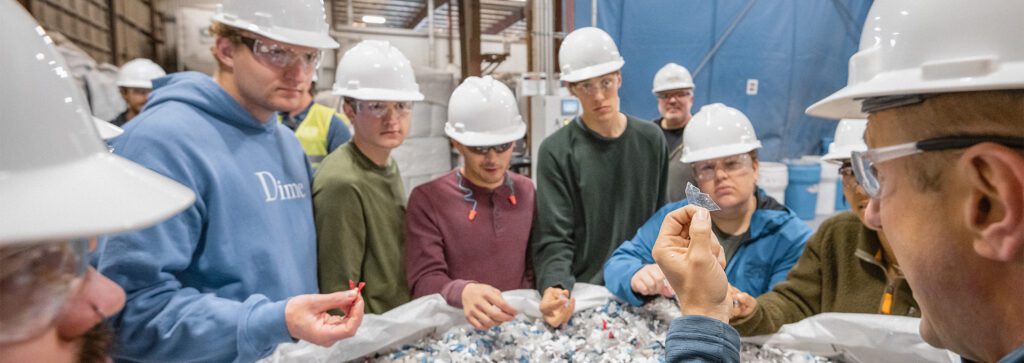Glossary
A primer in chemical recycling and the Agilyx ecosystem

Glossary
Chemical recycling
Chemical recycling – also known as advanced, molecular or feedstock recycling – refers to the sophisticated technologies used to convert post-use plastics (polymers) back to their original chemical building blocks (monomers) for continued reuse. As the only recycling process that makes plastic a circular resource, advanced recycling is critical to solving the problem of plastic waste and enabling the world’s transition to a low-carbon economy.
Circular economy
The circular economy describes a more sustainable economic system that is based on the “reduce-reuse-recycle” principle. Unlike the “take-make-waste” linear economy, circularity is considered essential to addressing climate change, better managing the world’s resources and achieving the UN Sustainable Development Goals.
EPR
EPR stands for Extended Producer Responsibility and is an environmental policy approach where a producer is responsible for the entire life cycle of its product, from creation to disposal, in order to meet legal obligations. Under EPR, producers are responsible for designing products with materials that have the lowest possible environmental impact and are optimized for recycling. The producer is also responsible for the post-use collection and treatment of its products with a focus on recycling
ESG
This abbreviation stands for the range of environmental, social and governance criteria used to evaluate the sustainability performance of a company or business and determine its level of financial risk. ESG factors play an increasingly important role for investors in both the public and private markets.
Feedstock
A feedstock is a single and uniform raw material that is used to drive an industrial process or act as fuel. Post-use plastic feedstocks can be used to create virgin-equivalent plastic, as well as plastic intermediates or other valued low-carbon products.
ISCC PLUS Certification
This independent and internationally recognized certification system, used to verify the allocation of recycled content in a manufacturer’s product, was developed by the International Sustainability & Carbon Certification. ISCC PLUS certification ensures a company’s compliance with sustainability and traceability requirements along the supply chain.
Mass balance
In short, mass balance is used to calculate and confirm the recycled content in a given product. It enables the tracking of recycled material throughout the industrial process, allowing the manufacturer or brand owner to claim how much of the final product can be attributed to recycled content. Third-party certification by recognized institutions, such as the ISCC, is critical in determining the accuracy of mass balance claims.
Mechanical recycling
According to Plastics Europe, mechanical recycling refers to the processing of plastics waste into secondary raw material or products without significantly changing the chemical structure of the material. Because the plastic is downgraded into lower-quality plastic with each cycle, it eventually winds up in landfills or the environment, and is therefore not circular.
Pathway
The pathway is the general term used to describe a more sustainable use of post-use plastic, rather than disposal in landfills or the environment. Agilyx has created commercial plastic-to-plastic pathways for polystyrene, with others underway.
Plastic-to-plastic recycling
This process involves using advanced recycling technology to break post-use plastic down into its original chemical components, which are fed back into the manufacturing process to create new, equally recyclable plastics. At a commercial scale, plastic-to-plastic recycling is the only way to turn plastic into a circular resource and exponentially increase global recycling rates.
Plastic intermediate
Plastic or chemical intermediates refer to base products that require additional steps prior to use in the production of new plastics. They do not include the direct monomers needed to produce new polymers.
Post-use plastics
Post-use plastics – also called post-consumer or waste plastics – are the used plastic products that are collected as part of waste management systems. They are either recycled or disposed of, winding up in landfills or the environment.
Pyrolysis
Pyrolysis describes the process of using heat to decompose materials and change their chemical composition. Agilyx uses an IP-protected pyrolysis technology which, in the absence of oxygen, breaks down the polymer chains without combustion (and its associated by-products).
Styrene monomer
A raw material used to create numerous plastic products and synthetic rubber. Agilyx uses an IP-protected pyrolysis technology to break down the polymer chains of multiple types of post-consumer plastics back into its original styrene building block enabling the recycling into new products again and again.